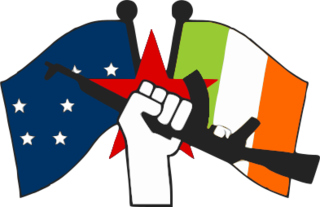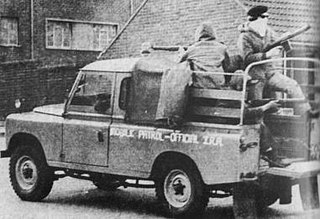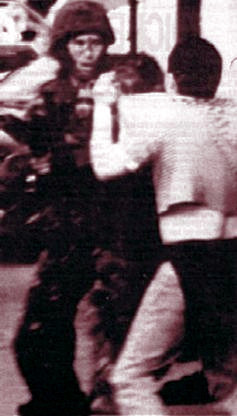Related Research Articles

The Continuity Irish Republican Army, styling itself as the Irish Republican Army, is an Irish republican paramilitary group that aims to bring about a united Ireland. It claims to be a direct continuation of the original Irish Republican Army and the national army of the Irish Republic that was proclaimed in 1916. It emerged from a split in the Provisional IRA in 1986 but did not become active until the Provisional IRA ceasefire of 1994. It is an illegal organisation in the Republic of Ireland and is designated a terrorist organisation in the United Kingdom, New Zealand and the United States. It has links with the political party Republican Sinn Féin (RSF).

The Provisional Irish Republican Army, officially known as the Irish Republican Army and informally known as the Provos, was an Irish republican paramilitary force that sought to end British rule in Northern Ireland, facilitate Irish reunification and bring about an independent republic encompassing all of Ireland. It was the most active republican paramilitary group during the Troubles. It argued that the all-island Irish Republic continued to exist, and it saw itself as that state's army, the sole legitimate successor to the original IRA from the Irish War of Independence. It was designated a terrorist organisation in the United Kingdom and an unlawful organisation in the Republic of Ireland, both of whose authority it rejected.
The Real Irish Republican Army, or Real IRA (RIRA), was a dissident Irish republican paramilitary group that aimed to bring about a United Ireland. It was formed in 1997 following a split in the Provisional IRA by dissident members, who rejected the IRA's ceasefire that year. Like the Provisional IRA before it, the Real IRA saw itself as the only rightful successor to the original Irish Republican Army and styled itself as simply "the Irish Republican Army" in English or Óglaigh na hÉireann in Irish. It was an illegal organisation in the Republic of Ireland and designated a proscribed terrorist organisation in the United Kingdom and the United States.

The Troubles were an ethno-nationalist conflict in Northern Ireland that lasted for about 30 years from the late 1960s to 1998. Also known internationally as the Northern Ireland conflict, it is sometimes described as an "irregular war" or "low-level war". The conflict began in the late 1960s and is usually deemed to have ended with the Good Friday Agreement of 1998. Although the Troubles mostly took place in Northern Ireland, at times violence spilled over into parts of the Republic of Ireland, England, and mainland Europe.

The Irish National Liberation Army is an Irish republican socialist paramilitary group formed on 8 December 1974, during the 30-year period of conflict known as "the Troubles". The group seeks to remove Northern Ireland from the United Kingdom and create a socialist republic encompassing all of Ireland. With membership estimated at 80–100 at their peak, it is the paramilitary wing of the Irish Republican Socialist Party (IRSP).

The Official Irish Republican Army or Official IRA was an Irish republican paramilitary group whose goal was to remove Northern Ireland from the United Kingdom and create a "workers' republic" encompassing all of Ireland. It emerged in December 1969, shortly after the beginning of the Troubles, when the Irish Republican Army (IRA) split into two factions. The other was the Provisional IRA. Each continued to call itself simply "the IRA" and rejected the other's legitimacy.
The Independent International Commission on Decommissioning (IICD) was established to oversee the decommissioning of paramilitary weapons in Northern Ireland, as part of the peace process.
Jean McConville was a woman from Belfast, Northern Ireland, who was kidnapped and murdered by the Provisional Irish Republican Army (IRA) and secretly buried in County Louth in the Republic of Ireland in 1972 after being accused by the IRA of passing information to British forces.
Several people are reported to have served as Chief of Staff of the Irish Republican Army in the organisations bearing that name. Due to the clandestine nature of these organisations, this list is not definitive.
The Kingsmill massacre was a mass shooting that took place on 5 January 1976 near the village of Whitecross in south County Armagh, Northern Ireland. Gunmen stopped a minibus carrying eleven Protestant workmen, lined them up alongside it and shot them. Only one victim survived, despite having been shot 18 times. A Catholic man on the minibus was allowed to go free. A group calling itself the South Armagh Republican Action Force claimed responsibility. It said the shooting was retaliation for a string of attacks on Catholic civilians in the area by Loyalists, particularly the killing of six Catholics the night before. The Kingsmill massacre was the climax of a string of tit-for-tat killings in the area during the mid-1970s, and was one of the deadliest mass shootings of the Troubles.

Denis Martin Donaldson was a volunteer in the Provisional Irish Republican Army (IRA) and a member of Sinn Féin who was killed following his exposure in December 2005 as an informer in the employ of MI5 and the Special Branch of the Police Service of Northern Ireland. It was initially believed that the Provisional IRA were responsible for his killing although the Real IRA claimed responsibility for his murder almost three years later. His friendship with French writer and journalist Sorj Chalandon inspired two novels: My Traitor and Return to Killybegs.
Provisional Irish Republican Army arms importation in forms of both firearms and explosives began in the early 1970s during the Troubles. With these weapons it conducted an armed campaign against the British state in Northern Ireland.

Operation Banner was the operational name for the British Armed Forces' operation in Northern Ireland from 1969 to 2007, as part of the Troubles. It was the longest continuous deployment in British military history. The British Army was initially deployed, at the request of the unionist government of Northern Ireland, in response to the August 1969 riots. Its role was to support the Royal Ulster Constabulary (RUC) and to assert the authority of the British government in Northern Ireland. This involved counter-insurgency and supporting the police in carrying out internal security duties such as guarding key points, mounting checkpoints and patrols, carrying out raids and searches, riot control and bomb disposal. More than 300,000 soldiers served in Operation Banner. At the peak of the operation in the 1970s, about 21,000 British troops were deployed, most of them from Great Britain. As part of the operation, a new locally-recruited regiment was also formed: the Ulster Defence Regiment (UDR).
Diarmuid O'Neill, was a volunteer in the Provisional Irish Republican Army (IRA). O'Neill was killed in London in 1996 during a police raid on the hotel where he and two other IRA volunteers were staying. Due to the circumstances surrounding the killing, Amnesty International has called for a review of the police investigation into the killing of O'Neill. O'Neill was the only IRA member to be killed by police in Great Britain.
The Reavey and O'Dowd killings were two coordinated gun attacks on 4 January 1976 in County Armagh, Northern Ireland. Six Catholic civilians died after members of the Ulster Volunteer Force (UVF), an Ulster loyalist paramilitary group, broke into their homes and shot them. Three members of the Reavey family were shot at their home in Whitecross and four members of the O'Dowd family were shot at their home in Ballydougan. Two of the Reaveys and three of the O'Dowds were killed outright, with the third Reavey victim dying of brain haemorrhage almost a month later.
This is a timeline of actions by the Irish republican paramilitary groups referred to as the Real Irish Republican Army and New Irish Republican Army. The Real IRA was formed in 1997 by disaffected members of the Provisional IRA. Since July 2012, when Republican Action Against Drugs (RAAD) and other small republican groups merged with it, the group has been called the New IRA; although it continues to call itself simply "the Irish Republican Army".
This is a chronology of activities by the Provisional Irish Republican Army, an Irish republican paramilitary group in the 21st century.

The 1992 Coalisland riots were a series of clashes on 12 and 17 May 1992 between local Irish nationalist civilians and British Army soldiers in the town of Coalisland, County Tyrone, Northern Ireland. The Third Battalion 1992 tour's codename was "Operation Gypsy".

On the evening of 26 March 1997, the Provisional Irish Republican Army (IRA) East Tyrone Brigade launched an improvised grenade attack on the fortified Royal Ulster Constabulary/British Army base in Coalisland, County Tyrone, Northern Ireland. The blast sparked an immediate reaction by an undercover Special Air Service unit, who shot and wounded Gareth Doris, an Irish republican and alleged IRA volunteer. The SAS unit was then surrounded by a crowd of protesters who prevented them approaching Doris or leaving. RUC officers arrived and fired plastic bullets at the crowd, allowing the special forces to leave the area.
References
- ↑ "Four face 'IRA smuggling' charges". 28 November 2002. Archived from the original on 13 April 2021. Retrieved 18 January 2023.
- ↑ "Six Held in N.Ireland Over IRA Florida Gun Case" Archived 2007-09-27 at the Wayback Machine , Reuters . Accessed 2007-10-05.
- ↑ Wilson, Jamie."IRA denies sanctioning US gun plot", The Guardian , 1999-08-07. Accessed 2007-10-05.
- ↑ "Lies catch up with Teflon leaders" Archived 10 March 2007 at the Wayback Machine , NewsHound . Accessed 2007-10-05